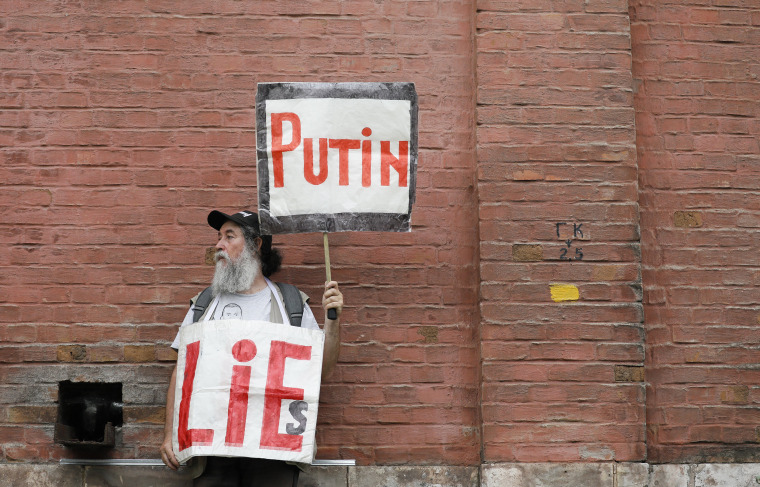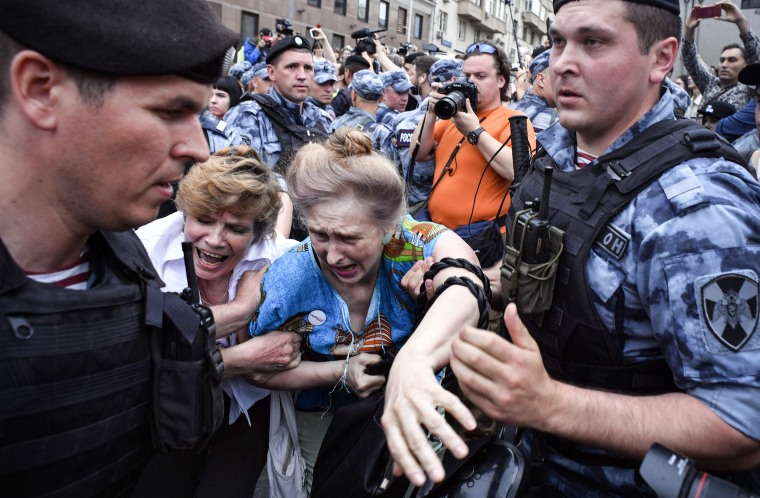On June 8 and 9, Russians in Moscow and in towns across the nation picketed their local police headquarters with calls to free Ivan Golunov, a reporter known for investigating government corruption. He had been arrested June 6 on alleged narcotics charges. As the demonstrations grew, Russia’s Interior Ministry suddenly dismissed the case on June 11 and announced those involved in Golunov’s detention had been fired.
For Vladimir Putin’s Russia, this legal reversal seems unprecedented and surprising. Unprecedented, maybe. But surprising? Not any more.
For Vladimir Putin’s Russia, this legal reversal seems unprecedented and surprising. Unprecedented, maybe. But surprising, not any more.
A few years ago, the authorities, intent on showing that they are fully in control, would never have backed down. And the people would have put up with it, swallowing that injustice. But not now. While Golunov was in custody, for example, a large march for his freedom was called for June 12, Russia’s Independence Day. After his release, the march was unsanctioned and a state-approved affair was offered for the less busy Saturday. Yet thousands went to protest “for civil society” anyway, gray clouds and drizzling rain notwithstanding.
Want more articles like this? Sign up for the THINK newsletter to get weekly updates on the important political news and analysis
Over the past year, protests against government actions have become a regular occurrence. After two decades of Putin, the public has gotten increasingly fed up with the authorities’ tactics and resolved to speak up. It’s yielded results.
In May, for example, thousands rallied in Yekaterinburg, Russia’s fourth-largest city, against the local government’s plan to build a church on a park site. Threats of detention and job loss couldn’t deter the protesters’ resolve. A month earlier, over a thousand miles away in Arkhangelsk, a city on the White Sea, thousands more marched against construction of a waste dump in a tiny town of Shiyes. Both projects were canceled.

Golunov’s story has received the most attention, however, because he was a well-known investigative journalist in the nation’s capital.
Moreover, fellow reporters rallied to dig into his case. They quickly and convincingly discovered that the reason for his arrest was tied to his investigations for Meduza, an online news site, that revealed corrupt lucrative Moscow road construction projects and shady financial ties between FSB (former KGB) apparatchiks and the funeral industry. Journalists also swiftly disputed the official photographs of Golunov’s apartment, where he allegedly kept the drugs. All but one were not even of his apartment, and all have since been taken down from the police website.
For the five days he was detained, “We are Ivan Golunov” blared from Dozhd TV, RTVi and other independent Russian media channels. Three major Moscow newspapers published the same slogan on their front page. Facebook, Twitter and other social media were flooded with calls for justice. Outside Petrovka 38, the daunting headquarters of the Ministry of Internal Affairs, crowds with placards demanding Golunov’s release stood baking in the hot sun.
The Kremlin was stunned by the forceful response. The press and public figures, including many from the pro-Kremlin media establishment, came out in defense of their colleague. The case improbably united the opposition and the state loyalists against the police, as well as other siloviki (power and security structures), who have long been seen as amassing too much power and cited for turning Russia into a de facto police state.
Even Dmitry Kiselev, the Da Vinci of Kremlin propaganda, spoke out. True, he still mocked the media’s outrage, but also suggested failures of overzealous functionaries in Russian security. Irada Zeinaeva, a Kremlin hand on NTV, also called for a thorough investigation.
Putin, it was reported, had been briefed on the case, and he likely gave his wink to resolve it. His annual dog-and-pony show of openness, “Direct Line with the President,” is scheduled for June 20. People from across the country can call in to ask (heavily pre-screened) questions, and Putin would not want the program, devised to present his caring face to the nation, to be overwhelmed by questions related to the scandal. Golunov’s release also gave Putin an opportunity to send the siloviki a message not to overstep.
So it was that Interior Minister Vladimir Kolokoltsev made the announcement. He had found some “bad apples” in Russian security and ordered that officials in charge of the drug investigations into Golunov be fired.
Shaken by the backlash, the state seemed to be saying, we are not as brutal as you think we are. Perhaps, though, it is too late.
But the Golunov affair revealed more than just police incompetence and corruption. It unmasked the general state of Russian lawlessness, in which narcotic cases have become an easy way to discredit those whom officials want silenced. Consider, in January 2018, Oyub Titiev, the head of the Chechen branch of the human rights organization Memorial, was arrested for marijuana possession. Like Golunov, he accused the authorities of planting the drugs. The case made waves, but not enough to ensure Titiev’s freedom — Chechnya is far from the capital and public outrage was not so widespread at the time. After Golunov’s arrest, however, Titiev was suddenly released from prison. (Though not yet cleared of the alleged crime.)
Shaken by the backlash, the state seemed to be saying, we are not as brutal as you think we are. Perhaps, though, it is too late.
At the June 12 protest in Moscow, for example, as in Yekaterinburg or Archangelsk, few protestors appeared afraid — though the police, paratroopers and national guards clearly outnumbered the demonstrators. In addition, public buses were parked nearby, their windows draped to hide soldiers waiting inside, ready for action. Giant orange road sweepers were used to block the streets, and some poured water on the marchers. Police, alternating between calm and anger, mostly hunted the young who carried placards calling for justice for other victims of the fabricated narcotics cases. They detained more than 200 people throughout the day.
Yet the evening news on the Kremlin-connected channels made no mention of the Moscow protests. Instead, they showed footage of people cheerfully celebrating Independence Day by re-enacting Russians’ fights for freedom against foreign armies — the French during the Napoleonic Wars in 1812 or the Germans during World War II in 1945. Talking about “alternative facts”! TV managed to edit out scores of police that took over Moscow on this gloomy day in 2019.
The state seems puzzled by its inability to pacify the public. By addressing a singular issue — a journalist is arrested, we will free him; don’t want a church, we won’t build it — the Kremlin fails to recognize the public’s widespread discontent with the state’s arbitrary despotism.
It is possible that the government’s continuing to back down will manage to appease future protesters. But the years of public humiliation could also have reached a simmering point. Protests against bad governance, failing social services, growing inflation, falling living standards and lack of police accountably could evolve into wider political dissatisfaction with Putin’s regime.
Meanwhile, specific events continue to spark outrage. And any of those sparks could very likely catch a larger anti-Kremlin fire.

